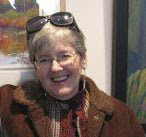There is a lovely poignant poem quoted in the novel, A Lantern in Her Hand:
Pain has been, and grief enough, and bitterness and crying,
Sharp ways and stony ways I think it was she trod;
But all there is to see now is a white bird flying,
Whose bloodstained wings go circling high - circling up to God
by Margaret Widdener
Beth Streeter Aldrich wrote the novel, A Lantern in Her Hand, in 1928. It is a classic story of a pioneer woman. She modeled the protagonist, Abbie Deal, on her own mother, who in 1854 had traveled by covered wagon to the Midwest. In A Lantern in Her Hand, Abbie accompanies her family to the soon-to-be-state of Nebraska. There, in 1865, she marries and settles into her own sod house. The novel describes Abbie’s years of child-raising, of making a frontier home able to withstand every adversity. Aldrich was a disciplined writer who knew many true stories of pioneer days in Nebraska. She captures the strength in everyday things, the surprise of familiar faces, and the aura of the unspoiled landscape during the different seasons of the year. Refusing to be broken by hard experience, Abbie set a joyful example for her family.
My mother and grandmother both loved this book. I remember Granny telling us riveting stories of how her parents struggled to survive during similar pioneering days in Canada. The story I remember most vividly was about a time in the depths of winter when the young mother and her small child were alone in their rude forest cabin while her husband took their only gun to hunt for the wolves who were getting bolder and bolder in their attacks. A pack besieged the cabin one night. She had brought their cow and calf inside and carried child and calf up to the loft. The wolves broke down the door and killed the defenseless cow, but the mother, her little one, and the calf were spared. Mother gave me the book to read when I was eleven or so. I found the story exciting but, at that green age, I fear that many of the nuances of the mother's myriad struggles eluded me. I was deeply touched by the poem however, because at some level it struck a resonant chord in my heart. I remember copying it out and keeping it carefully in a small jewelry box for years. That's gone now like so many other small treasures, but I have never forgotten that verse after some fifty-five years.
April 28 marks the twenty-sixth year of my Mother's passing. I've written previously on this blog about her greatness of heart. Her mother was her teacher as she was mine. What I remember most about Granny was her kind blue eyes that saw everything, her soft voice, and her stautuesque height. She had the knack of making her grandchildren feel that each was the most important child in the whole world. My grandmother passed on not long after I finished the Lantern book.
Mother nursed Granny in our home for the last two years of her life, struggling with the aftermath of a devastating stroke. She was paralyzed and could not speak, but her cognition wasn't affected and her smile, that always lighted up a room, was still there. I remember telling her all about my ups and downs at school and life in general; I never doubted she understood every word. She and Mother were always particularly close so the loss of language was never a barrier. It was uncanny how my mother developed a similar disease, suffering a series of debilitating strokes that resulted in her becoming an invalid for two years before her passing. My brother, Jim, never left her side during this time and I along with my father was always nearby. Unfortunately, some whom she had treated with kindness, distanced themselves, particularly toward the end. I know how much this wounded her, more than the intensified painful physical decline. All she ever said to me was "I guess I must have done something very wrong, but I don't know what it was. Can you tell me?" Of course I couldn't. The reason didn't reside within her, rather in the distorted lenses of those others. It was a difficult thing for me to fathom and it was many years before I was able to let it go, certainly not as readily as she had. Looking for the fault in herself first was another huge lesson that I find sustains me now as my own health continues to deteriorate and some folks I've known for years have drifted away.
I never had the privilege of knowing my great grandmother, of course, but she was a tower of inner strength and wisdom which she instilled in Granny who relayed it to my Mother. Along with the good times, they all led challenging lives strewn with disappointments, pain, and heartaches. Granny and my Mother both suffered through long debilitating illnesses. There were never complaints, rather acceptance, adaptability, and an unwavering concern for others. What they transmitted to me took quite a while to take root, but now that it has I am reminded of that poem by Margaret Widdener and this verse from an old hymn by Fanny Crosby:
Thy word is a lamp unto my feet
And a light unto my path.
You're the light unto my path.

No comments:
Post a Comment